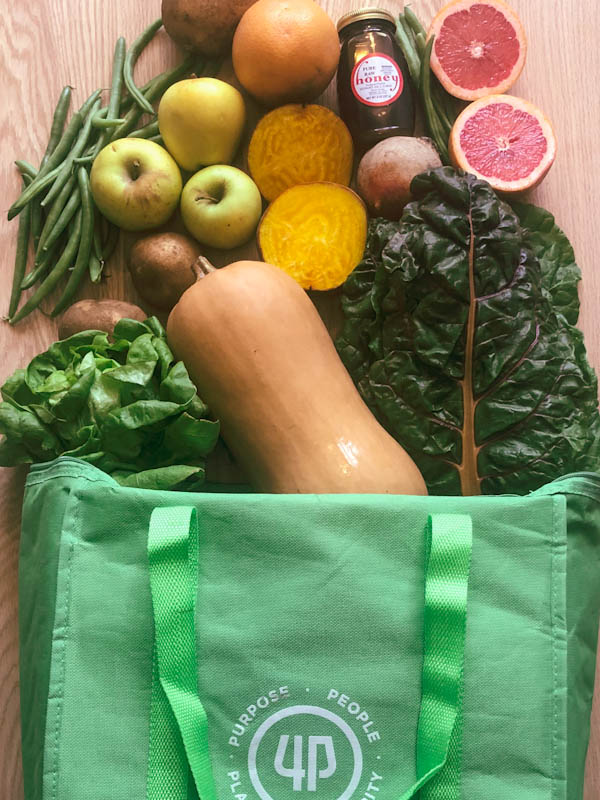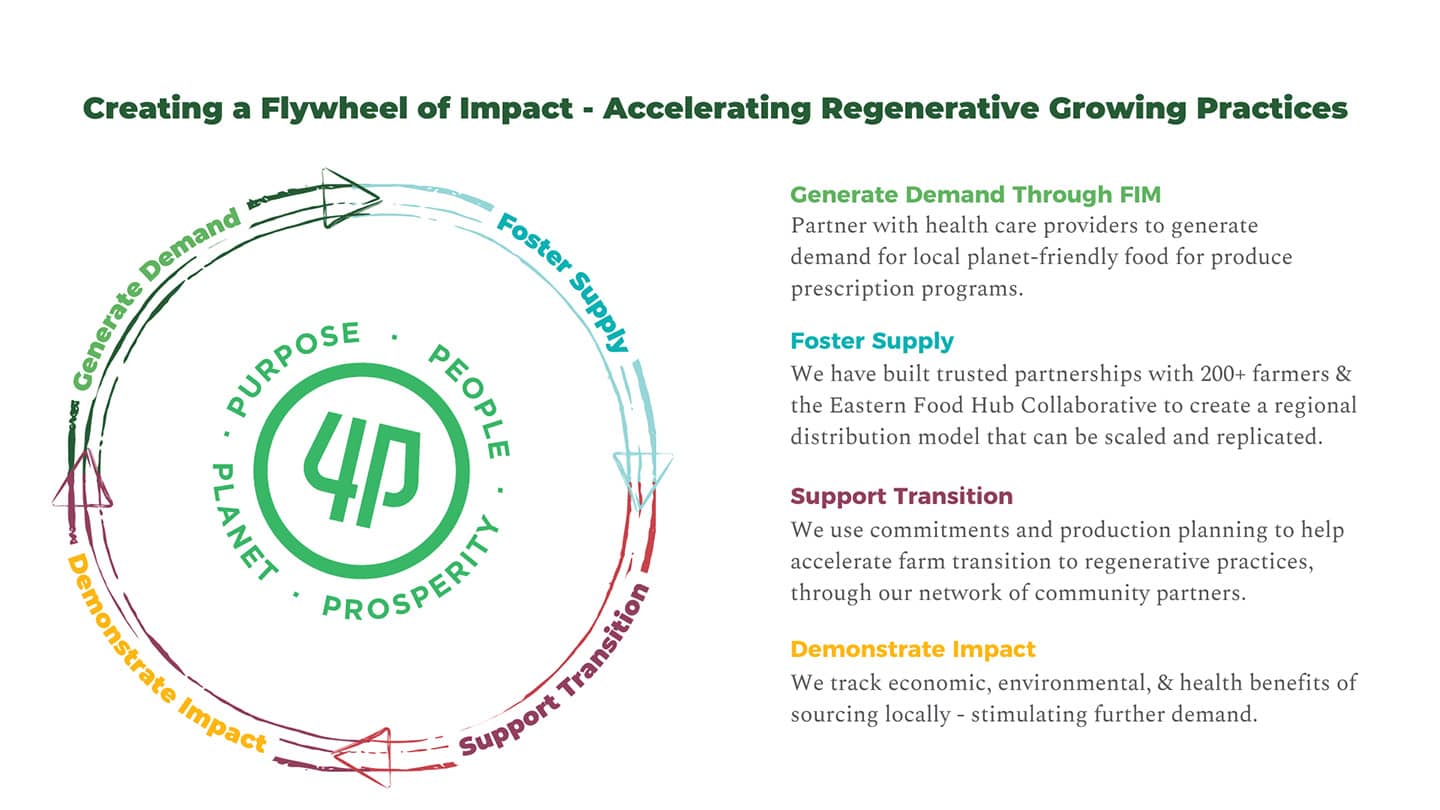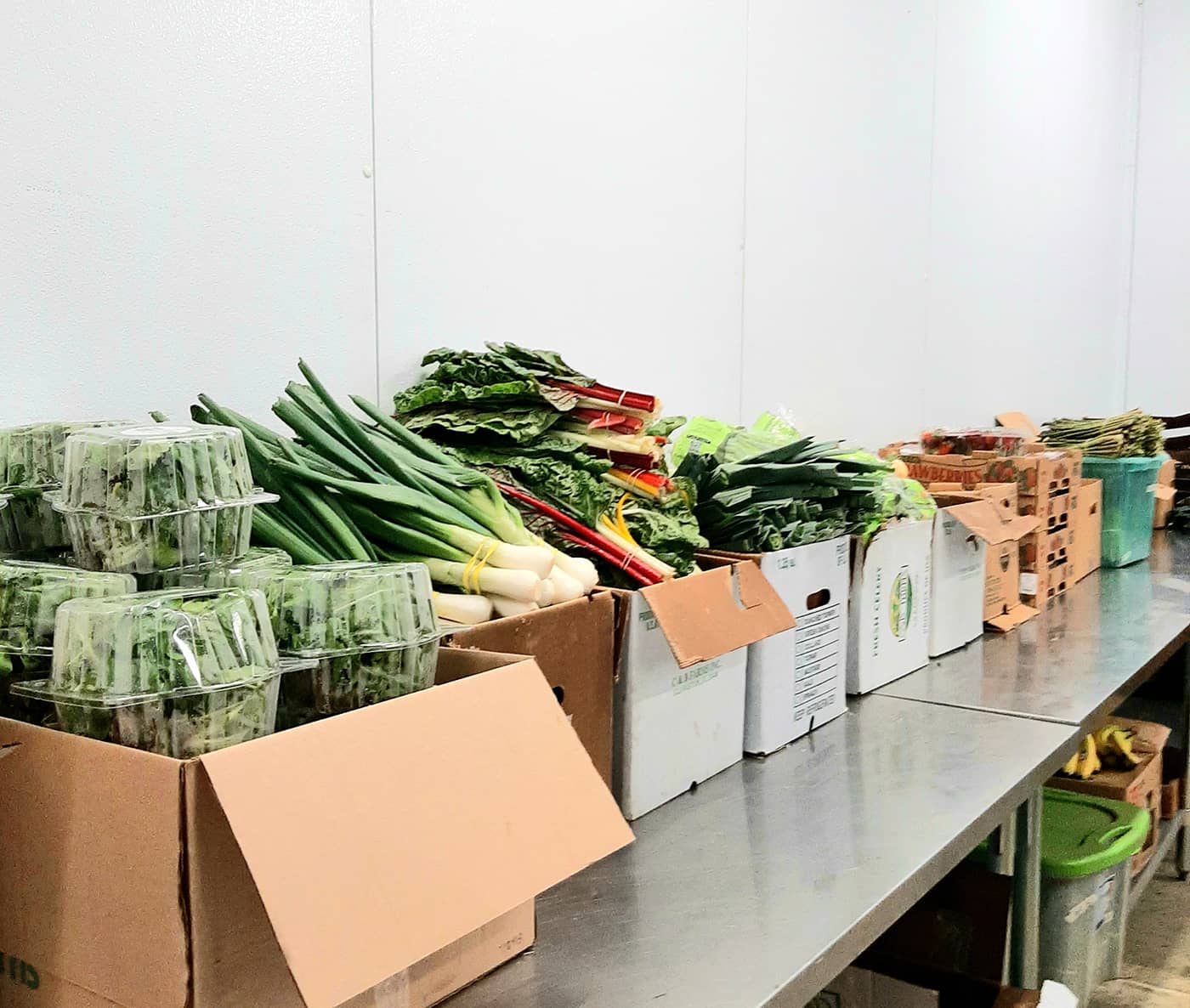Nurturing Ecosystems
Approaches Food Is Medicine (FIM) with attention to how food sourcing and supply systems shape not only nutrition and health, but also the natural environment and local economies.
Expansive Coalitions
Works to build resilient local food systems with a network of partners that includes farmers, health care providers and systems, food distributors, community organizations, and federal and private funders.
Cultivating Change
Invests in research and evaluation to demonstrate key health, economic, and environmental benefits of FIM initiatives rooted in local food sourcing.
Collaborator Profile
Established in 2014, 4P Foods helps to advance FIM efforts by providing nutritious, locally sourced foods from regional farmers to organizations and individuals across the mid-Atlantic region. The mission of 4P Foods is to build a new regional, regenerative, and accessible food system that mitigates climate change, maximizes farmers’ profits, and provides all people with dignified access to healthy food from farmers. 4P Foods is a positively disruptive market solution that prioritizes social good, recognizing that multiple societal factors and multifaceted collaborations intersect to create and sustain cyclical patterns of impact.
4P Foods was included in the Bright Spots series as an exemplar of social good business approaches to FIM to demonstrate how food production, food provision, and the health of people and their communities can be connected to form a viable business model. 4P Foods’ business model was based on the knowledge that sourcing from local farmers is associated with many nutritional, economic, and environmental benefits, as highlighted by Michigan State University Community Food Systems, Good Food Purchasing, and the University of Virginia [PDF - 5.0 MB].
Leveraging Local Foods for FIM
Distribution Channels
4P Foods purchases whole foods from over 200 small and medium-sized family farms, and value-added products from 40 processors, a third of whom are minority- or woman-owned. The products are aggregated and stored in 4P Foods warehouses for distribution through one of three channels: 1) wholesale, 2) direct-to-consumer, or 3) FIM initiatives. The FIM initiatives support organizations such as food banks, food pantries, faith-based organizations, health clinics in low-income areas, and health care systems.
New Systems to Address Food Insecurity and Facilitate FIM Programs
In 2021, Children’s National Hospital partnered with 4P Foods, the American Heart Association, and YMCA of Metropolitan Washington to launch a program called “FliPRx” to improve diet quality among families experiencing food insecurity in Washington, DC. Clinicians follow various screening processes to refer children aged 0-18 (and an adult caregiver) who are food insecure and have diet-related chronic disease risk.
Enrolled families receive twice-monthly, locally sourced produce deliveries from 4P Foods directly to their homes and receive corresponding virtual nutrition education.
Blended Funding
4P Foods has been awarded several funding opportunities that enable them to provide healthy and nutritious foods throughout the mid-Atlantic.
Philanthropic Investment
4P Foods’ initial pilot launched in partnership with Children’s National Hospital through philanthropic support from local funders to pay for the food, the delivery, and the nutritional education.
Regional Infrastructure Resources
The Regional Food System Partnerships awarded 4P Foods $1.6 million to build a regional transportation infrastructure to support the regional food ecosystem and strengthen its ability to deliver local food to families that are food insecure.
State and Local Funding to Catalyze Partnership
4P Foods was also awarded a $2.8 million Local Food Purchase Assistance (LFPA) cooperative agreement to deliver food throughout Virginia’s food bank network in partnership with the Federation of Virginia Food Banks.
Recently, 4P Foods was awarded a $2.25 million LFPA Plus cooperative agreement and $2 million from the Virginian Farms to Virginian Families food box program to expand purchasing from local farmers to reach families who are food insecure.
Key Components to Success
Improving Patient Health with Access to Healthy, Locally Grown Food
The 4P Foods local aggregation and distribution model from farm to family is designed to help its health care partners prescribe and deliver healthy, locally grown food directly to their patients who are food insecure. 4P Foods’ partnership with Children’s National Hospital, for instance, was critical to Children’s National’s ability to get healthy, locally grown food directly to families experiencing food insecurity in Washington, DC.
Clinicians referred patients to 4P Foods, while its other staff members conducted a survey analysis to measure the impact of the FIM program on improved food security and nutritional behavior for participating patients.
Funding for Regional Agricultural Development and Improved Health and Economic Outcomes
4P Foods has applied for a U.S. Department of Agriculture (USDA) grant program, called the Resilient Food System Infrastructure program, to strengthen the required infrastructure necessary to enable locally sourced FIM initiatives at scale. 4P Foods also advocates for policymakers in states like Virginia to pursue Medicaid 1115 demonstrations so Medicaid dollars can be used to prescribe healthy food to patients who are food insecure while also realizing the positive economic, environmental, and nutritional benefits of sourcing this food locally.
When appropriate, procurement incentives are in place through well-designed Medicaid 1115 demonstrations. For example, there can be measurable positive health impacts for patients who are food insecure as well as economic benefits for local farmers and regional rural economies by sourcing this food locally.
Contracting With Local Farmers
4P Foods is building demand for local food through FIM contracts with farmers. Through these contracts, farmers agree up front to grow specific produce that is then delivered to FIM program participants.
Sourcing food locally through values-based procurement — a framework that prioritizes pre-specified criteria, such as regenerative growing practices or environmental sustainability, when sourcing food — can benefit patients, farmers, health care systems, and surrounding rural economies.
In a traditional food supply chain, food changes hands 7 to 12 times over thousands of miles. This practice reduces farmers’ profits and disconnects consumers from food sources, including knowledge of who grew the food and how it was treated.
In contrast, the 4P Foods supply chain maximizes farmers’ profits, provides transparency about farmers and their farming techniques, and facilitates produce customization to meet the cultural needs of the communities that they serve.
By sourcing locally, 4P Foods highlights its farmers’ and producers’ growing conditions, reduces the number of miles food travels, and reduces the number of times food changes hands. Thus, local sourcing reduces contamination risk and shortens the time between harvest and consumption, resulting in more nutrient-dense foods.
Regenerative Growing Practices
By increasing demand for local food and enabling financial security through a set of pre-commitments that are generated through FIM contracts, 4P Foods and a group of community-based technical assistance providers invest in working with farmers to employ regenerative growing practices such as using cover crops, no-till farming, composting, and agroforestry.
These practices can improve soil health and further deepen the measurable impact of regenerative growing, leading to greater demand, which in turn can accelerate the regenerative transition through a flywheel of impact (see graphic below).
4P Foods encourages other FIM implementers to source food locally so that they can help realize similar environmental, nutritional, and economic benefits. By demonstrating these benefits and the cost savings to the health system through FIM programs that source food from local farmers with increasingly regenerative growing practices, values-based procurement can become standard practice in the design of statewide FIM programs and help influence other public institution procurement decisions and programs.
Community Impact
Increasing Provision of Healthy Food to Support Local Farmers
During 2021 and 2022, 4P Foods delivered more than 120,000 produce and protein boxes to disadvantaged communities throughout Virginia and Washington, DC, via four different FIM programs including the Children’s National Hospital in Washington, DC, and the Fresh Farmacy program in Charlottesville, Virginia.
In 2023, 4P Foods procured food from 126 small and mid-size farmers in Virginia, Maryland, Pennsylvania, West Virginia, North Carolina, and Washington, DC; 27 percent of these states self-identified as socially disadvantaged. In the same year, 4P Foods also procured food from 12 food hubs and co-ops.
Investing in Evaluation to Demonstrate True Cost and Value of Food
4P Foods leveraged national best practices, metrics from national organizations (e.g., Center for Good Food Purchasing), and its partnership with the Children’s National Hospital to develop an evaluation tracker to measure multi-dimensional progress.
The Children’s National Hospital conducted a survey analysis which showed that 4P Foods increased produce availability, improved healthy food purchasing, and had a positive impact on the way families prepared and consumed food at home. Additionally, 4P Foods collects data on farmers, food travel distance, and customers.
By the end of a pilot period, 4P Foods aims to work with evaluation partners to demonstrate early progress in the following areas:
- Improvement in overall health of the participant (e.g., reduction in blood sugar, decrease in BMI, lower rates of depression)
- Improvement in nutritional behavior of participants
- Increased revenue for participating farmers
- Increased investment into participating farms
- Economic multiplier effects in the economy of local rural communities
- Improved planet-friendly growing practices among participating farmers
- Reduced miles traveled for local food procurement vs. the industrial alternatives
- High program replicability for other partners in the mid-Atlantic region
4P Foods aspires to work with policymakers at the state level to strengthen incentives to purchase food locally for FIM through thoughtful and intentional design of states’ Medicaid 1115 demonstrations.
To identify long-term funding and business model support, 4P Foods endeavors to partner with federal agencies, such as National Institutes of Health (NIH), U.S. Department of Health and Human Services (HHS), and USDA. 4P Foods is also exploring an expanded partnership with the U.S. Postal Service for food distribution, specifically last mile delivery.
Centering Community Needs
Directing FIM Resources to Populations Who Are Vulnerable or Disadvantaged
4P Foods prioritizes communities that are traditionally marginalized by assisting farmers that are socially disadvantaged who deliver healthy, culturally relevant food to families experiencing food insecurity. 4P Foods provides culturally relevant food to a diverse consumer base by leveraging its partnerships with the Children’s National Hospital and community-based organizations (CBOs) such as the Capital Area Food Bank and Washington Nationals Philanthropies.
Measuring Health Outcomes Across Implementation
Patients at the Children’s National Hospital who receive food deliveries from 4P Foods share their experiences with their clinicians. The clinicians then provide 4P Foods staff with feedback on patients’ food delivery experiences and food preferences, which 4P Foods staff use to improve and craft a more individualized experience for each consumer.
Centering Purchasing Choices and Leadership to Support Producer Variety
4P Foods also works with other key anchor institutions, like universities and school systems, to increase their commitments to purchasing from Black, Indigenous, and people of color (BIPOC) farmers. These multi-channel procurement commitments increase revenue for BIPOC farmers, enabling them to grow and meet the growing demand generated by health care partners through FIM.
Looking Forward to Scale
4P Foods envisions increased impact and an accelerated shift to more responsible food procurement in FIM programs by scaling a network of replicable demonstration programs across the mid-Atlantic. Greater scale is required to enable rigorous evaluation and measurement to demonstrate the positive benefits of sourcing local food for FIM programs and building a new food system that mitigates climate change, maximizes farmers’ economic well-being, and provides all people with dignified access to healthy food from local farmers.
To scale its FIM pilot programs, 4P Foods is seeking to partner with a wide variety of partners such as:
- Health care providers and CBOs to help refer eligible patients who are food insecure and provide nutrition education
- Thought leadership organizations such as the Rodale Institute, Health Care Without Harm, Nutrient Density Alliance, Recipe4Health, and the Periodic Table of Food Initiative for shared learning
- Evaluation and story-telling partners to collect and share data that will inform policy and funding flows and contribute to a replicable playbook for locally sourced FIM initiatives
- Philanthropic partners and policymakers to help catalyze and sustain these efforts





